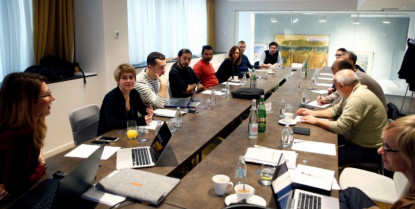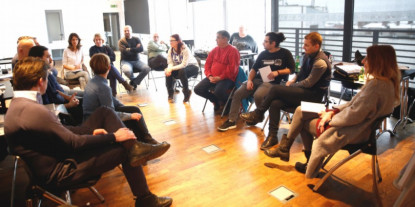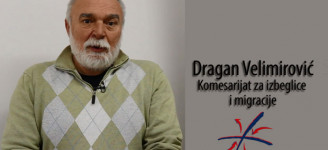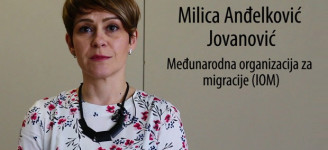Trainers of the Migration Training Centre Improve Capacities of Migration Service Providers in their Work with Vulnerable Groups
The "Support to strengthening migration and asylum management in the Republic of Serbia" Project, implemented by the International Organization for Migration with the support of the British Embassy in Belgrade, included the ToT program, training of future trainers of the Migration Training Center. The training that began in March 2018 was attended by six representatives of the Commissariat for Refugees and Migrations and six representatives of the International Organization for Migration, who analysed standard operating procedures for children and women, international legal frameworks, domestic legislation, internal organization and the competencies of institutions that provide assistance to migrants...
 DANIJELA RADIĆ, as a consultant, led this one-year training process successfully. In addition to educational part, the training included mentoring support to future trainers, representatives of CRS and IOM, to help hem enhance their competences and capacities.
DANIJELA RADIĆ, as a consultant, led this one-year training process successfully. In addition to educational part, the training included mentoring support to future trainers, representatives of CRS and IOM, to help hem enhance their competences and capacities.
Speaking about the overall experience, she said that back in March 2018, she did not know what to expect because, as she said, she did not have any influence on the selection of candidates for the training of trainers.
- I was fortunate to work with a group of very dedicated people willing to learn and cooperate. Together with colleagues, experts in different fields covered by the training of future trainers, I devised activities and exercises used as a background for acquiring knowledge and skills in key areas important for the field of migration in Serbia. Now, looking back at the very beginning of the project, I can say that the results have exceeded my original expectations, Danijela Radić said.
Since the available time was short, and the areas to be covered by the learning process was vast, the entire team engaged in capacity building had to make extra efforts to impart relevant competences to future trainers. Participants of the training, Danijela explained, were sharing with each other relevant information gained in many years of their field work. They were open, communicative, bold, and were learning from each other. Owing to this, they have all learned how to respond to different challenges that they may face not only when delivering migration trainings, but also in their daily work.
- This process has significantly contributed to bringing together and strengthening ties between the representatives of the Commissariat for Refugees and Migration of the Republic of Serbia and the International Organization for Migration. Participation in the project, according to their statements, has contributed to their better understanding of the positions and tasks carried out in the field from the perspective of different actors, but also to improving future cooperation in their daily work. I am very satisfied with the knowledge and skills that the participants gained by the end of the training, although learning does not end there. Danijela Radić believes that with this process, both CRS and IOM have got a motivated group of professionals with significant, comprehensive experience, including trainer’s experience, in the field of migration, who are willing to transfer their knowledge and acquired experience to others.
- I perceive them as the pillars of the Migration Training Centre, because it is not only its management but also those who represent it in public that make such structures. Training needs in the field are high and I sincerely hope that IOM and CRS, as organizations, will focus part of their strategic cooperation on continuing to build their own capacities in order to continue with significant improvements on the ground in the entire field of migration in Serbia. Also, I believe that development of such resources has the potential to expand its field of operation beyond the borders of Serbia, Danijela Radić concluded.
 DUŠAN MILJOJKOVIĆ joined training program as a representative of the Commissariat for Refugees and Migration of the Republic of Serbia, where he has been employed since May 2016. He has worked in centres in Krnjača, Šid, Bosilegrad, Kikinda and Obrenovac, and currently he is head of the shift in the Obrenovac Reception Centre. He takes care that everything operates well in the Centre, from migrants’ accommodation and stay, through stuff work, to material matters.
DUŠAN MILJOJKOVIĆ joined training program as a representative of the Commissariat for Refugees and Migration of the Republic of Serbia, where he has been employed since May 2016. He has worked in centres in Krnjača, Šid, Bosilegrad, Kikinda and Obrenovac, and currently he is head of the shift in the Obrenovac Reception Centre. He takes care that everything operates well in the Centre, from migrants’ accommodation and stay, through stuff work, to material matters.
At the beginning of the training, he said, he did not have big expectations, but after a while he became aware of the seriousness of the project.
- What I liked most was working with people who have valuable experience and knowledge and make efforts to make the workshops as interactive as possible to make them more interesting to participants. Field experience is most important and useful in this type of work because the applicability of all theoretical notions must be checked against practical knowledge gained in the field. I was able to share with my colleagues something new that I have learned, based on what was presented and based on participants' experiences, Dušan said.
In the following period, he sees himself at some new trainings, in the role of a trainer but also in the role of a participant, because there is a huge number of topics that could be covered, of course in the context of the migrant situation in Serbia. He emphasized that he would like to address more thorougly the question of security in the Centres, both of employees and migrants, questions related to personal, collective and material security. He regards that as a person who has been working many years exclusively with single adult male population he could much contribute to the work of the centre.
- I would say that I have been privileged to be part of this project and a part of the team selected based on performance, knowledge and experience to work as trainers. With the opening of the Migration Training Centre, the Commissariat and the state, as well as the IOM, have demonstrated genuine seriousness and professionalism in addressing the issue of migrations.
 NEMANJA BOŽOVIĆ has been active in emergency situations for more than seven years. He spent the first four years in the Red Cross of Palilula, in 2015 he was engaged as a field worker of the Commissariat for Refugees and Migration (CRS), then as a field coordinator and later coordinator of the reception centres for migrants and refugees. Since January 2018 he has been working as a consultant of the International Organization for Migration (IOM) on a project with CRS.
NEMANJA BOŽOVIĆ has been active in emergency situations for more than seven years. He spent the first four years in the Red Cross of Palilula, in 2015 he was engaged as a field worker of the Commissariat for Refugees and Migration (CRS), then as a field coordinator and later coordinator of the reception centres for migrants and refugees. Since January 2018 he has been working as a consultant of the International Organization for Migration (IOM) on a project with CRS.
- I did not have big expectations at the beginning of the project because I did not see myself in this sphere, nor did I have confidence in my teaching / trainer’s skills. The work and learning process was interesting and quite different from all the other practices in adult training. I have to say that I liked most the selection of people, both those leading the project, and the participants, now trainers. The experiences we exchanged, the personal qualities of each of us, and the positive energy that was created at the very beginning, were crucial for the success of this whole story - Nemanja pointed out.
As for the future, he would like to work in some of the international missions in the world.
- It would not be the end of my engagement as a trainer, because I would like to return to Serbia every time with a richer experience and would be happy to transfer it to others. My current professional aspirations are related to monitoring, evaluation and reporting area, as well as the protection of vulnerable groups and coordination of field work in emergencies – Nemanja said, who from a confused person who asked himself at the beginning of the training ‘What is this all for", came to the stage of asking ‘When is the next training’.
 LAZAR PEJČIĆ is a coordinator in the Reception Centre for Migrants in Kikinda. For three years he has been working for the Commissariat for Refugees and has been in daily contacts with both service providers and service beneficiaries. At the beginning of the training, in March last year, he doubted his communication skills and the ability to transfer his knowledge to colleagues, but soon realized the importance of the opportunity given to him.
LAZAR PEJČIĆ is a coordinator in the Reception Centre for Migrants in Kikinda. For three years he has been working for the Commissariat for Refugees and has been in daily contacts with both service providers and service beneficiaries. At the beginning of the training, in March last year, he doubted his communication skills and the ability to transfer his knowledge to colleagues, but soon realized the importance of the opportunity given to him.
- My previous experience gained through my work with beneficiaries was valuable in working with service providers because, when we talked about laws, I knew exactly how these laws were applied in practice. In addition, it was much easier for us to present the procedures and protocols we have discussed on personal examples, which are plentiful. We could relate all the topics: vulnerability, abuse, with examples from our experience, Lazar explained.
He assessed as particularly interesting in the trainings, exercises with role swaps, assigning NGO service providers a role of CRS field worker, and vice versa, because in such situations it is easiest to understand the complexity of work with migrants, their position and needs.
- The result of this was a better understanding of mutual responsibilities and positions, which automatically improved understanding and cooperation among all of us. This is, as far as I'm concerned, one of the most important contributions of these trainings. I do not know in which direction this entire story will evolve, but I would like to get an opportunity to share my newly acquired knowledge with my colleagues, because all of this will contribute to a better migration and asylum management in Serbia and then in the region.
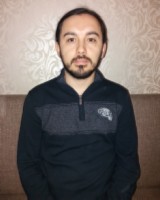 VLADIMIR LUKIĆ has been working with the Commissariat for Refugees and Migration of the Republic of Serbia for four years, and is currently engaged as a field worker at the Krnjača Reception Centre for Migrants.
VLADIMIR LUKIĆ has been working with the Commissariat for Refugees and Migration of the Republic of Serbia for four years, and is currently engaged as a field worker at the Krnjača Reception Centre for Migrants.
As someone who was familiar with all the aspects of the major migrant crisis in 2015, he thinks that the idea of Opening a Migration Training Centre, where migration actors from the whole region will be attending trainings, is excellent and will help us all to enhance our work.
- I have a lot of field experience, and now I have gained special skills and knowledge through the ToT program, so I think that I will be able to help many new colleagues from the Commissariat and other institutions to get familiar with the legislative framework, procedures and standards. It is important that everyone first receives a basic training, to learn basic things at the beginning, and I hope that detailed treatment of individual topics and areas will be planned for the next period. Given that nobody knows how the migrant crisis will evolve, it is important that, in case of its escalation, all of us in the region are ready to respond - Vladimir stressed.
He best understood how much he has learned, and how much he had advanced from the first training, in his everyday work because, he said, owing to the newly acquired knowledge and skills he often finds himself in a situation to help his colleagues faced with a specific problem or dilemma.
- I am satisfied with my personal development, achieved through my participation in the program. At first, I had a problem with the public appearance, with addressing a large group of people, and now I almost have no problem. I feel big responsibility, but I have no fear of public appearance any more.





